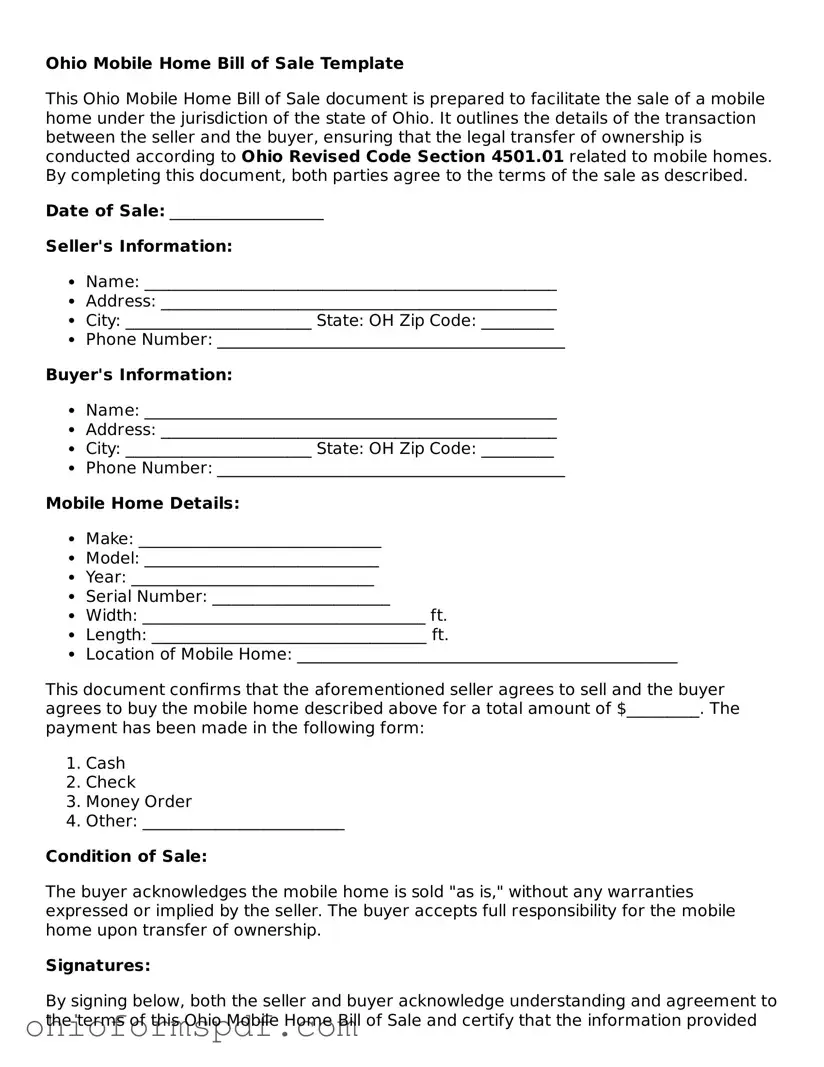The Ohio Mobile Home Bill of Sale form shares similarities with the Vehicle Bill of Sale. Both documents serve as legal proof of transfer of ownership between two parties. While the Mobile Home Bill of Sake focuses on the transaction of a mobile home, the Vehicle Bill of Sale covers the transaction of cars, motorcycles, and other vehicles. Each outlines crucial details like the make, model, year, and identification numbers, along with the names and signatures of both the buyer and seller, ensuring the clarity of the transfer process.
Likewise, the Boat Bill of Sale echoes the necessity of documenting a sale, this time for watercraft. Similar to the Mobile Home Bill of Sale, it captures essential information such as make, length, and hull identification number (HIN). Furthermore, it may require notarization, depending on the state's regulations, to verify the authenticity of the signatures, providing a layer of security and validation to the transaction.
The General Bill of Sale is another document closely related to the Ohio Mobile Home Bill of Sale. Designed to record transactions of personal property items outside of vehicles and boats, it might include electronics, equipment, or other valuable assets. Both documents aim to protect buyer and seller rights, prevent potential disputes, and offer a clear record of the exchange, including a description of the items and the parties' details.
The Real Estate Purchase Agreement shares the purpose of detailing a transaction between two parties, focusing specifically on real estate, which can include land or buildings. Although the Ohio Mobile Home Bill of Sale targets mobile homes' sales, both documents establish the terms and conditions of the sale, identifying information about the buyer and seller, and ensuring a mutual understanding and agreement on the transaction.
In a similar vein, the Pet Bill of Sale documents the transfer of ownership of animals, particularly pets like dogs, cats, or horses. Just as the Mobile Home Bill of Sale includes specific details about the property being sold, the Pet Bill of Sale outlines the animal's breed, age, health information, and any other relevant details, ensuring the buyer is well informed about their new companion.
The Equipment Bill of Sale focuses on the transaction of machinery and equipment, paralleling the Ohio Mobile Home Bill of Sale in its function to provide evidential proof of ownership transfer. Items often listed include construction equipment, farming machines, or office equipment, with details like make, model, and serial number featured prominently, safeguarding both parties' interests.
The Firearm Bill of Sale similarly documents the exchange of ownership, this time for firearms. Much like the Mobile Home Bill of Sake, it includes specific identifying information about the item sold, such as make, model, caliber, and serial number, and it might also stipulate the need for background checks or other legal requirements, emphasizing the importance of safety and legality in the transaction.
The Business Bill of Sale captures the exchange details of a business between a buyer and a seller, much like the Ohio Mobile Home Bill of Sale documents a mobile home's sale. This document outlines the business's assets being transferred, including physical assets, intellectual property, and sometimes liabilities, ensuring a comprehensive understanding of what is included in the transaction.
Similarly, the Warranty Deed is a document used in real estate transactions that ensures the property being sold is free from liens or claims, guaranteeing clear title to the buyer. While it serves a different legal function than the Ohio Mobile Home Bill of Sale, both documents play critical roles in the transfer of property, offering peace of mind and protection to the buyer.
Lastly, the Promissory Note can be likened to the Ohio Mobile Home Bill of Sale in that it represents an agreement between two parties concerning a financial transaction. While the former outlines the terms of a loan, including repayment schedule and interest rates, the Mobile Home Bill of Sale records a one-time transaction for the sale of property. Both are legal documents that define the responsibilities and expectations of each party involved.

